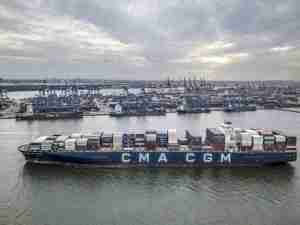The dry freight market has been pressured by growing deliveries ordered before the economic turmoil of 2008 with the pace of ships hitting the water set to increase this year.
"We should have on average a asofter market than in 2010 largely because of the oversupply of ships," said Michael Bodouroglou, chairman and chief executive officer of Paragon Shipping Inc, which has a fleet of dry bulk and container ships.
Bodouroglou said there would be rate volatility in 2011.
"The demand is very strong and it will continue to be strong, but the supply of ships has to take its toll and has to have an impact," he told Reuters on the sidelines of a shipping conference in London.
The Baltic dry freight index has fallen to its lowest in nearly two years in recent days, hit by the ship glut.
"There is oversupply which is going to take time -- maybe two three years -- and that is a problem for the dry cargo market," said Spyros M. Polemis, chairman of the International Chamber of Shipping, an association that represents about 80 percent of the global seaborne industry.
The situation has been compounded by flooding in Australia, the world's biggest coal exporter, which has disrupted shipping activity especially with the larger capesize vessels, which typically haul 150,000 tonne cargoes such as iron ore and coal.
"The expectation is that it should not last for more than, say, a month and half to two months, so things should be getting back to normal again," Bodouroglou said.
"However, it is my definitely my expectation that we will have some strengthening of the market probably in the second quarter."
Analysts say the smaller supramax and handysize vessels have more flexibility to diversify their cargoes to other commodities such as sugar and grains.
"There could be a slight rise in the market going into the end of the second quarter, third quarter on the handy and the supramax market," Johnny Plumbe, chief executive of broker ACM Shipping Group, told Reuters.
Headwinds
Bodouroglou said capesizes were a bigger concern to everyone in the industry. "The largest part of the order book concerns the larger ships, the capes," he said.
"The panamax, supramax and particularly the handies will fare a lot better particularly in the second quarter, which is the season where the grain trades pick up from South America. These are trades which are accommodated in the smaller sizes."
Economic headwinds in the West, a major source of shipping demand, has been compounded by inflationary fears in China, potentially leading to monetary tightening and a pullback in demand for ore, which may be another setback for dry shippers.
"It is still necessary for any prudent ship owner to continue anticipating the unexpected, especially if governments decide to withdraw much of the financial stimulus which has been applied to the world economy as a whole," Polemis said.
"The possibility of a change in policy in China, and the negative impact this may have on shipping's recovery, cannot be overstated," he told the conference. (Reuters)








